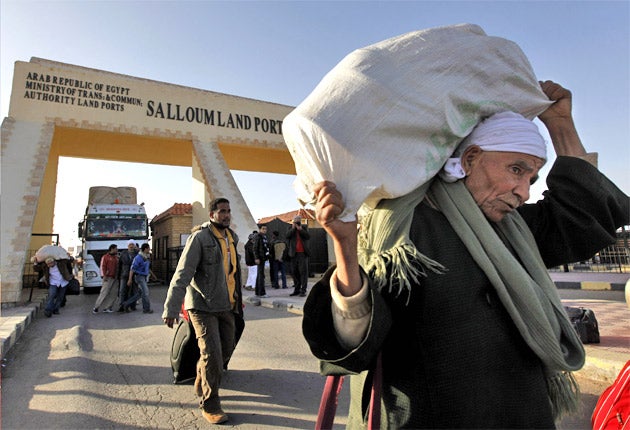Refugees from Libya tell of descent into chaos
Thousands fleeing indiscriminate killing and mob justice, reports Catrina Stewart from the Salloum crossing

Your support helps us to tell the story
From reproductive rights to climate change to Big Tech, The Independent is on the ground when the story is developing. Whether it's investigating the financials of Elon Musk's pro-Trump PAC or producing our latest documentary, 'The A Word', which shines a light on the American women fighting for reproductive rights, we know how important it is to parse out the facts from the messaging.
At such a critical moment in US history, we need reporters on the ground. Your donation allows us to keep sending journalists to speak to both sides of the story.
The Independent is trusted by Americans across the entire political spectrum. And unlike many other quality news outlets, we choose not to lock Americans out of our reporting and analysis with paywalls. We believe quality journalism should be available to everyone, paid for by those who can afford it.
Your support makes all the difference.There were frenzied scenes on the Egyptian-Libyan border yesterday as thousands of people, mainly Egyptian workers, fled a brutal crackdown by the Libyan leader, Colonel Muammar Gaddafi. Many brought with them vivid and disturbing accounts of a country plunged into utter chaos, where swathes of the population have dispensed mob justice in bloody reprisal killings.
"There has been a state of terror and fear since the first day of the protests," said Mustafa Igaz, a casual labourer who had been working in Al Bayda, a town in north-eastern Libya that has been the scene of clashes with government forces. Another worker said: "Security has disappeared. There's no safety anymore."
More than a hundred minivans lined the road leading to Egypt's Salloum border crossing, waiting patiently to pick up the thousands of people making their way out of Libya. A constant stream of people crowded through the crossing, making way for honking vehicles, while many raced with all of their possessions to secure a seat on departing vans.
Many appeared relieved to be going home, others resigned, while some were angry that Libyans were seemingly being left to their fate, and appealed to the West for help.
Much of the anger was also directed at the foreign mercenaries reported to be on the streets of Libya's cities, many shipped in from countries such as Chad and Zimbabwe. They have been reviled for their indiscriminate killing of Libyans, accused of firing wildly at anyone on the streets, even children.
Ahmed Ibrahimi, an Egyptian labourer, showed gruesome footage captured on his mobile phone of an African mercenary being hanged from a hook in Al Bayda, a victim of mob justice after Colonel Gaddafi's crackdown left many hundreds dead.
Another described how protesters, already in control of many areas, marched on Abrouk military airport after learning that a plane loaded with reinforcements was coming in to land. He said that protesters tricked the mercenaries into leaving the airport for the town by pretending to be Gaddafi loyalists, only to later capture and kill them.
Others had sympathy for the mercenaries, saying that they did not know what they were being brought in to do.
"These mercenaries came to the country with lots of money but some of them didn't even know what the hell they were doing in Libya until they arrived, and then some of them went back," said one Egyptian, who had fled from Al Bayda, 125 miles east of Benghazi, the eastern regional capital.
Benghazi, which fell to protesters after days of intense fighting, has seen some of the deadliest clashes, with the death toll reportedly in the hundreds, and hospitals struggling to cope.
Amir Rabiaa, an Egyptian who had been living in the town, described a horrific discovery at a military camp to which government forces had retreated as the town fell to the protesters, but nevertheless continued to shoot.
"I went to the camp... and I saw big drains with people inside them. We only found them because of the smell," he said, adding that he saw "many, many" bodies. He said they had been killed by government forces.
The scale of the killings has left some convinced that, unlike the Egyptian and Tunisian leaders, the Libyan leader will fight to the end, a view reinforced by defiant statements he has made in recent days.
"Gaddafi is not going to step down like Mubarak and Ben-Ali," said Mr Ibrahimi. "He is going to kill each and every one of the Libyan people. People need to come and help."
Join our commenting forum
Join thought-provoking conversations, follow other Independent readers and see their replies
Comments